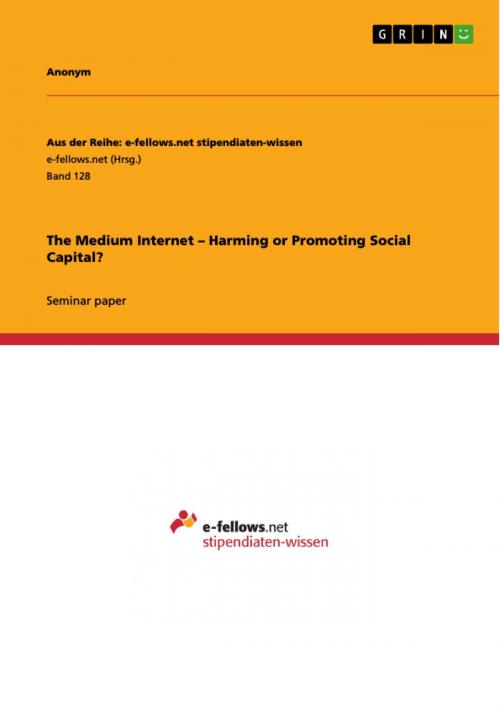The Medium Internet - Harming or Promoting Social Capital?
Nonfiction, Social & Cultural Studies, Social Science| Author: | Anonymous | ISBN: | 9783640964567 |
| Publisher: | GRIN Verlag | Publication: | July 21, 2011 |
| Imprint: | GRIN Verlag | Language: | English |
| Author: | Anonymous |
| ISBN: | 9783640964567 |
| Publisher: | GRIN Verlag |
| Publication: | July 21, 2011 |
| Imprint: | GRIN Verlag |
| Language: | English |
Seminar paper from the year 2008 in the subject Social Studies (General), grade: 1,33, Jacobs University Bremen gGmbH, language: English, abstract: While writing this essay, it became clear to me that our upcoming generation can hardly imagine how this world looked like, before the triumph of the internet about ten years ago turned our information-based society upside down. Internet has taken up an enormous speed of growing, that justifies labeling it the Super Medium. Participation is easy and cheap; there is not much technology or expertise necessary, while at the same time traditional forms of media, such as print media, letters, or the telephone are all combined and readily available. Pertaining to the course background of this paper, the networking component of this medium obviously plays a central role. The Internet facilitates finding partners for any form of interaction. Networking, furthermore, is possible on the societal and the individual level which is a unique feature. These and many more characteristics call for a more detailed examination of the internet with regards to Social Capital. Widespread research about this relation has already been conducted, yet outcomes and interpretations vary drastically. This paper will bring more order in this conflicting field by tackling the question whether the internet has a positive or negative impact on Social Capital. Thus, first a precise definition of Social Capital is provided. Followed by this, positive arguments about the internet are presented and underpinned by existing research findings. The third section then focuses on major refutations of the internet propagating Social Capital. Ultimately, a concise comparison of both 'sides' shows that the positive impact of the internet overall prevails.
Seminar paper from the year 2008 in the subject Social Studies (General), grade: 1,33, Jacobs University Bremen gGmbH, language: English, abstract: While writing this essay, it became clear to me that our upcoming generation can hardly imagine how this world looked like, before the triumph of the internet about ten years ago turned our information-based society upside down. Internet has taken up an enormous speed of growing, that justifies labeling it the Super Medium. Participation is easy and cheap; there is not much technology or expertise necessary, while at the same time traditional forms of media, such as print media, letters, or the telephone are all combined and readily available. Pertaining to the course background of this paper, the networking component of this medium obviously plays a central role. The Internet facilitates finding partners for any form of interaction. Networking, furthermore, is possible on the societal and the individual level which is a unique feature. These and many more characteristics call for a more detailed examination of the internet with regards to Social Capital. Widespread research about this relation has already been conducted, yet outcomes and interpretations vary drastically. This paper will bring more order in this conflicting field by tackling the question whether the internet has a positive or negative impact on Social Capital. Thus, first a precise definition of Social Capital is provided. Followed by this, positive arguments about the internet are presented and underpinned by existing research findings. The third section then focuses on major refutations of the internet propagating Social Capital. Ultimately, a concise comparison of both 'sides' shows that the positive impact of the internet overall prevails.















